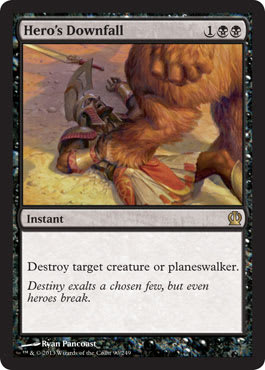Friday was one of those days when everything goes wrong. I couldn’t find the cards for my Standard deck for the longest time and had to pull apart three existing decks to put a new one together. I almost missed the bus to Friday Night Magic because it arrived five minutes early, and my phone fell out of my jacket pocket as I ran down the street to catch it; the phone landed face-down on the pavement, and the screen completely shattered. Then, perhaps because I was still reeling from previous events, I lost more games at FNM than I have in over a year.
Afterward, when my boyfriend Robert and I were driving our friend Simon home, Simon asked me what went wrong. I didn’t know quite what to say at first; like my day as a whole, my poor performance at FNM was the result of several small setbacks that weren’t necessarily linked. “My opponents played a lot of cards I wasn’t expecting,” seemed to be the best way to summarize it. I briefly recounted my loss to an Abzan Midrange player whose deck included Heroes' Bane, a card I’d only seen at the Journey into Nyx prerelease and whose text was completely foreign to me. I was in top-deck mode when the Hydra hit the field, and when I couldn’t mise a Hero's Downfall, Heroes' Bane clocked me for 14 with a little help from Ajani, Mentor of Heroes in what might be the biggest flavor fail I’ve ever witnessed. Simon and Robert now refer to the card as “Hallie’s Bane.”
Strange things happen at FNM, but the truth is that I haven’t been winning much at all lately. Seemingly all Magic players go through rough patches from time to time, and it appears I’m in the middle of one right now. I haven’t won a single 8–4 Draft on Magic Online since Dragons of Tarkir came out, and I haven’t fared particularly well when I’ve played in person. During Khans of Tarkir and Fate Reforged, I was cashing larger tournaments, paying for online Drafts with prize packs, and consistently going undefeated at Friday Night Magic. I thought I was finally getting better, so why am I losing so much?
There have been plenty of articles written about losing in Magic—“Learning to Lose” by Jackie Lee and “Competing Constructively” by Gathering Magic’s own Natasha Lewis Harrington immediately come to mind—and I highly recommend reading them if you’re interested in the psychology of competition. In this article, I want to focus on how our attitudes toward losing change over time and how to make it over plateaus and losing streaks.
I go to FNM at my local store for a lot of reasons. I enjoy spending time with my friends, interacting with the community, and running the gauntlet with a new deck before a major tournament. But more often than not, the biggest deciding factor for me is whether any of the newer players I know will be attending. FNM is a big step for some of the Lady Planeswalkers Society members I advise, so when they show up to the store on Friday nights, I try to be there to support them.
I commend the new players who show up week after week, even when they don’t win enough matches to qualify for prizes, because my own Magic career is short enough that I still remember how it feels to lose all the time. I remember how upset I would become whenever I made a mistake, such as the time I missed a Delver of Secrets trigger with my Return to Ravnica–era U/R Burn deck. I realized my error as I held out the Pillar of Flame I had drawn for the turn, but my opponent wouldn’t let me take it back. We moved on with the game, and I eventually lost, but I learned my lesson and never missed a Delver trigger again.
Losing was frustrating in the beginning, but the challenge of facing better players and the lessons I took away from each loss offered some consolation. I was constantly surrounded by more experienced competitors and comrades—at the game store, at Cube, at the Pro Tour Qualifiers I rushed to attend—and I took every opportunity to pick their brains and soak up all they had to teach me. I accelerated my Magic education by playing three, four, or sometimes five times a week. I occasionally became impatient and asked my friends when I would become a “decent Magic player,” which I defined as a player who wins the majority of his or her matches. “You have to lose a lot of matches before you can start winning,” they said. I find myself repeating this phrase to newer players to this day.
I finally started winning after about six months. I went 4–0 in one weekly Standard tournament in March 2013, and after that, the wins just kept coming. Throughout the spring and summer, I had about an 80% win percentage at Regular REL, but my opponents at competitive tournaments still outplayed me at every turn. It would take another six months or so for me to claw my way out of the dreaded 0–3 bracket, but I still found myself there from time to time.
Note that I said, “I started winning,” and not, “I stopped losing.” I still lose all the time—in fact, I’ve never won a Competitive REL tournament outright—but I found that I dealt with losing differently as I won more and more matches. When I first learned to play Magic, I was thrilled to win the occasional game and only vaguely disappointed when I lost. I became a defensive pessimist to ward off demoralization, telling myself that, regardless of the outcome of my matches, I was playing to have fun and learn something. But once I demonstrated that I could win at any level—at FNM, at a Pro Tour Qualifier, at a Grand Prix—each loss felt like a step in the wrong direction. “I won’t make that mistake again” became “I can’t believe I made that mistake!”
That’s when I started experiencing tilt.
I often like to say that people tilt in one of two directions: outward or inward. The people who tilt outward are easier to recognize because they’re so vocal about it: They complain to their friends or lash out at opponents after a tough loss. I’m the opposite: I distance myself from my teammates, find a quiet corner of the tournament hall, and mentally replay the match I just lost, looking for errors. This self-deprecating type of tilting goes by many names—Kenji Egashira says that he becomes “Dark Kenji;” I call the process “wilting.”
I wilted the most at the beginning of 2014. It was my second winter in Seattle; I was working part time as a record-store clerk (a job I hated more than I cared to admit to myself or others), struggling to find writing opportunities, and I wondering all the while if I might be suffering from Seasonal Affective Disorder. Standard was stagnant, with Mono-Blue and Mono-Black battling it out in feature-match areas week after week; I quickly lost my enthusiasm for what had been my favorite format, descending into the worst slump of my Magic career to date. One bad tournament led to another, and I eventually forced myself to take a break from the grind for a few weeks. By the time spring came around, I was over the hurdle, winning matches at PTQs and GPs and inching ever closer to the coveted Top 8 and Day 2 distinctions.
Now that I’m in the midst of another losing streak, I’ve tried to look back on my ill-fated winter and figure out what changed when I returned from my brief hiatus (besides my Vitamin D levels). For one thing, I channeled my frustration into playtesting more, and I started reaching out to different people in my Magic community for help. My tournament performances improved, and I started feeling more confident in my deck choices. I still lost from time to time, but I told myself that having a bad day didn’t give me an excuse to second-guess my abilities. I cut off the tape that played in my head whenever I wilted, replacing every instance of “I should have” with “I will.” In short, I stopped dwelling on the past and moved on to the next tournament, just as I did when I first started playing. If a certain card or deck didn’t work for me, no harm done—I would just try something different next time.
As I said at the beginning of this article, I am growing better at Magic each time I sit down across from a new opponent, and so are you. Until next time, be patient with yourselves, be kind to yourselves, and always look toward the future.




























